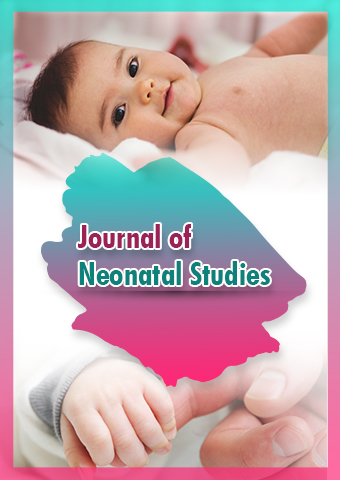Commentary - Journal of Neonatal Studies (2024) Volume 7, Issue 4
Caring for Critically Ill Newborns is One of the Most Challenging and Rewarding Aspects of Neonatal Medicine
- Corresponding Author:
- Marcos Claudia
Department of Neonatal Medicine, University of Valencia, Spain
E-mail: 75marcosclaudia@live.com
Received: 03-Jul-2024, Manuscript No. JNS-24-150525; Editor assigned: 05-Jul-2024, PreQC No. JNS-24-150525 (PQ); Reviewed: 19-Jul-2024, QC No. JNS-24-150525; Revised: 20-Aug-2024, Manuscript No. JNS-24-150525 (R); Published: 27-Aug-2024, DOI: 10.37532/JNS.2024.7(4).255-257
Description
Causes of critical illness in newborns
Critically ill newborns can present with a wide range of conditions that necessitate immediate and comprehensive medical intervention. Some common causes of critical illness in newborns include:
Prematurity: Infants born before 37 weeks of gestation are considered premature and are at higher risk for complications due to underdeveloped organs and systems. Premature infants often require respiratory support, temperature regulation, and specialized nutrition.
Respiratory Distress Syndrome (RDS): A common condition in premature infants, RDS occurs when the baby’s lungs are not fully developed and lack surfactant, a substance that helps keep the air sacs open. RDS can lead to severe breathing difficulties.
Sepsis: Neonatal sepsis is a life-threatening infection that can rapidly spread throughout the body. It can be caused by bacteria, viruses, or fungi, and requires prompt diagnosis and aggressive treatment with antibiotics or antivirals.
Congenital anomalies: Birth defects such as congenital heart disease, neural tube defects, and gastrointestinal malformations can result in critical illness. These conditions may require surgical intervention and long-term medical management.
Hypoxic-Ischemic Encephalopathy (HIE): This condition occurs when the newborn’s brain does not receive enough oxygen and blood flow during or after birth, leading to potential brain damage. Therapeutic hypothermia is often used as a treatment to reduce the risk of long-term neurological impairment.
Meconium Aspiration Syndrome (MAS): MAS occurs when a newborn inhales a mixture of meconium (the first stool) and amniotic fluid into the lungs, leading to respiratory distress and potential lung injury.
Challenges in managing critically ill newborns
The care of critically ill newborns presents several unique challenges:
Fragile health: Newborns, particularly preterm infants, have underdeveloped organs and systems, making them highly susceptible to complications and requiring specialized care.
Multisystem involvement: Critical illness in newborns often involves multiple organ systems, necessitating a comprehensive and coordinated approach to care. Conditions such as sepsis can affect the cardiovascular, respiratory, and renal systems simultaneously.
Rapid deterioration: The health status of critically ill newborns can change rapidly, requiring constant monitoring and the ability to respond quickly to any signs of deterioration.
Family stress and anxiety: The emotional and psychological impact on families of critically ill newborns is profound. Parents may experience stress, anxiety, and guilt, and require support from healthcare providers and mental health professionals.
Ethical considerations: Decisions regarding the care of critically ill newborns often involve complex ethical considerations, including the potential for long-term disability, the use of life-sustaining treatments, and end-of-life care.
Neonatal Intensive Care Units (NICUs)
Neonatal Intensive Care Units (NICUs) are specialized units within hospitals designed to provide comprehensive care for critically ill newborns. NICUs are equipped with advanced medical technology and staffed by a multidisciplinary team of healthcare professionals, including neonatologists, nurses, respiratory therapists, and other specialists. Key components of NICU care include:
Respiratory support: Ventilators, Continuous Positive Airway Pressure (CPAP) machines, and high-flow nasal cannulas are used to support the breathing of infants with respiratory distress.
Cardiovascular monitoring: Continuous monitoring of heart rate, blood pressure, and oxygen saturation is essential for detecting and managing cardiovascular instability.
Temperature regulation: Incubators and radiant warmers are used to maintain the body temperature of preterm infants who are unable to regulate their own temperature.
Nutritional support: Specialized feeding techniques, including parenteral nutrition (intravenous feeding) and nasogastric or orogastric tube feeding, are used to ensure proper nutrition and growth.
Infection control: Strict infection control measures, including hand hygiene and the use of sterile techniques, are critical for preventing infections in vulnerable newborns.
Family-centered care: NICUs emphasize the importance of involving families in the care of their infants. Parents are encouraged to participate in caregiving activities and are provided with support and education to help them understand their baby’s condition and treatment.
Management and treatment of critically ill newborns
The management and treatment of critically ill newborns require a comprehensive and multidisciplinary approach. Key aspects of care include:
Stabilization and resuscitation: Immediate stabilization and resuscitation are often necessary for critically ill newborns. This may involve airway management, administration of oxygen, and intravenous access for fluids and medications.
Respiratory support: Infants with respiratory distress or failure may require various forms of respiratory support, including mechanical ventilation, CPAP, or surfactant therapy for those with RDS.
Infection management: Prompt identification and treatment of infections are critical. Blood cultures, lumbar punctures, and other diagnostic tests may be performed to identify the causative pathogens, and appropriate antibiotics or antivirals are administered.
Surgical interventions: Infants with congenital anomalies or other surgical conditions may require timely surgical intervention. Surgeons and other specialists collaborate to plan and perform necessary procedures.
Therapeutic hypothermia: For infants with HIE, therapeutic hypothermia (cooling the baby’s body temperature) is used to reduce the risk of brain damage and improve long-term neurological outcomes.
Nutritional support: Ensuring adequate nutrition is essential for the growth and development of critically ill newborns. Nutritional support is tailored to the individual needs of each infant and may involve breast milk, formula, or specialized parenteral nutrition.
Neurodevelopmental support: Early interventions, such as physical therapy, occupational therapy, and speech therapy, are important for supporting the neurodevelopment of critically ill newborns. Developmental care practices, such as skin-to-skin contact (kangaroo care) and minimizing noise and light in the NICU, promote a supportive environment for growth and development.
Role of healthcare providers and families
The care of critically ill newborns is a collaborative effort that involves healthcare providers and families working together to achieve the best possible outcomes. Healthcare providers play a vital role in delivering high-quality, evidence-based care, while families provide essential emotional support and advocacy for their infants.
Healthcare providers: Neonatologists, nurses, respiratory therapists, pharmacists, and other specialists work together to develop and implement individualized care plans for each
infant. They continuously monitor the infant’s condition, provide treatments, and communicate with families about the infant’s progress.
Families: Parents and family members are integral to the care team. They provide comfort and emotional support to their infants, participate in caregiving activities, and advocate for their infant’s needs. Family-centered care emphasizes the importance of involving families in decision-making and supporting them throughout the NICU journey.
Conclusion
Caring for critically ill newborns is a complex and multifaceted endeavor that requires a coordinated and compassionate approach. Understanding the causes, challenges, and management strategies for critical illness in newborns is essential for providing the best possible care. Neonatal Intensive Care Units (NICUs) play a crucial role in delivering specialized care, and the collaboration between healthcare providers and families is vital for achieving positive outcomes. By advancing our knowledge and practices in neonatal care, we can continue to improve the survival and quality of life for critically ill newborns.

